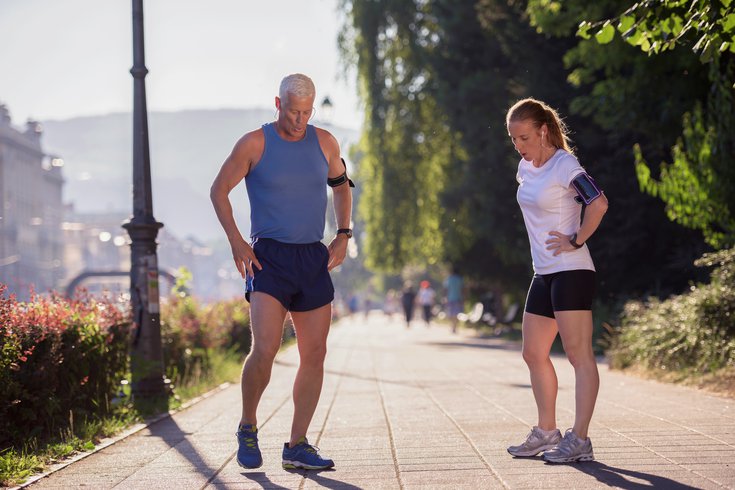
July 29, 2021
 Source/Image licensed from Ingram Image
Source/Image licensed from Ingram Image
Exercising in hot, humid weather necessitates that people closely monitor their fluid intake and rest at least 10 minutes during each hour of the workout, among other precautions.
I love a good outdoor run in the summer. Whether it's the path around the Cooper River by our home or the Promenade in Sea Isle City, working up a sweat and experiencing "runners high" is a great feeling. Yes, exercising outdoors is a great way to live healthy and enhance your well-being by connecting with nature — except when Mother Nature turns up the heat a little too high.
This summer has brought extreme heat to many areas across the United States, including the Philadelphia region. According to the U.S. Centers for Disease Control and Prevention, record high temperatures are occurring more frequently and climate change is causing more intense heat waves. This has a direct impact on human health, including heat-related illnesses and deaths. On average, about 700 heat-related deaths occur in the U.S. each year.
The increased potential for excessively hot weather can add a layer of complexity to your outdoor exercise routine, but it need not deter you from enjoying the benefits. With just a little bit of strategy and good judgement, you can build a portfolio of contingency plans to use when the hot weather hits.
The National Center for Environmental Health says that getting too hot can make you ill. If your body can't compensate for the heat and properly cool you down, you can become sick.
The main factors affecting your body's ability to cool itself during extremely hot weather are high humidity and personal factors, the Center says. When the humidity is high, sweat won't evaporate as quickly. This keeps your body from releasing heat as fast as it may need.
In addition, age, obesity, fever, dehydration, heart disease, mental illness, poor circulation, sunburn and prescription drug and alcohol use each can play a role in whether a person can properly cool off in extremely hot weather. Among those at the highest risk are people with chronic disease and those age 65 and older.
Under normal conditions, your skin, blood vessels and perspiration level adjust to the heat, the Mayo Clinic explains. But these natural cooling systems may fail if you're exposed to high temperatures and humidity for too long, you sweat heavily and you don't drink enough fluids. The result may be a heat-related illness.
If left untreated, the illness can include the following:
•Heat cramps, sometimes called exercise-associated muscle cramps
•Heat syncope, a feeling of lightheadedness or fainting
•Heat exhaustion, where you may experience nausea or vomiting
•Heatstroke, a life-threatening emergency condition.
Mayo Clinic experts urge you to pay attention to warning signs. If you experience them, stop exercising immediately and get out of the heat.
According to the U.S. Public Health Service, summer weather does not have to halt your outdoor exercise regimen. Their recommendations for exercising in hot and humid weather include resting 10 minutes for every hour, changing wet clothing frequently, avoiding the midday sun by exercising before 10 a.m. or after 6 p.m., using sunscreen, and wearing light-weight and breathable clothing.
Great advice on hydration can be found in the National Athletic Trainers' Association position statement on exertional heat illnesses. The trainers say athletes should begin exercise fully hydrated and regularly consume fluids when the workout duration exceeds 40 minutes. They note dilute carbohydrate-electrolyte drinks, like Gatorade or Powerade, are best for fluid replacement and also supply some substrate for exercising muscles. Post-exercise rehydration requires electrolyte and volume replacement.
Of course, there are indoor workouts that can offer a bridge until the weather cooperates. The Victorian Health Promotion Foundation provides the following ideas: train in an indoor gym with good air conditioning and ventilation, take an online yoga, dance, Pilates or high-intensity interval training class, go for a swim in an indoor pool, or participate in a studio or gym class in an air-conditioned venue.
While I love to get outside, the treadmill works fine, and I'm fortunate to have access to gyms at home and at the shore. Local schools, the YMCA, and municipal recreation centers all represent alternatives when the temperature rises to serious levels.
I previously presented the case that the science shows exercising in nature leads to greater health benefits than performing the same activity indoors, and that individuals are more likely to repeat being physically active when the exercise is performed in a natural environment. So, no question that whenever possible, there are benefits to getting outdoors. When followed, the tips here will maximize your ability to stay connected with nature. If the appropriate call is to get inside, again, there are strategies that can serve you well.
If the past 16 months have proved anything, it is our ability to be flexible and stay resilient in the face of ever-changing conditions. Climate change certainly presents a serious threat with world-wide impact and very personal implications. Sound familiar? So is the response.
When it comes to sustaining your healthy behaviors, understand the challenge, plan accordingly and stay strong and committed to your well-being. You and your loved ones will be the better for it.
Louis Bezich, senior vice president and chief administrative officer at Cooper University Health Care, is author of "Crack The Code: 10 Proven Secrets that Motivate Healthy Behavior and Inspire Fulfillment in Men Over 50." Read more from Louis on his website.